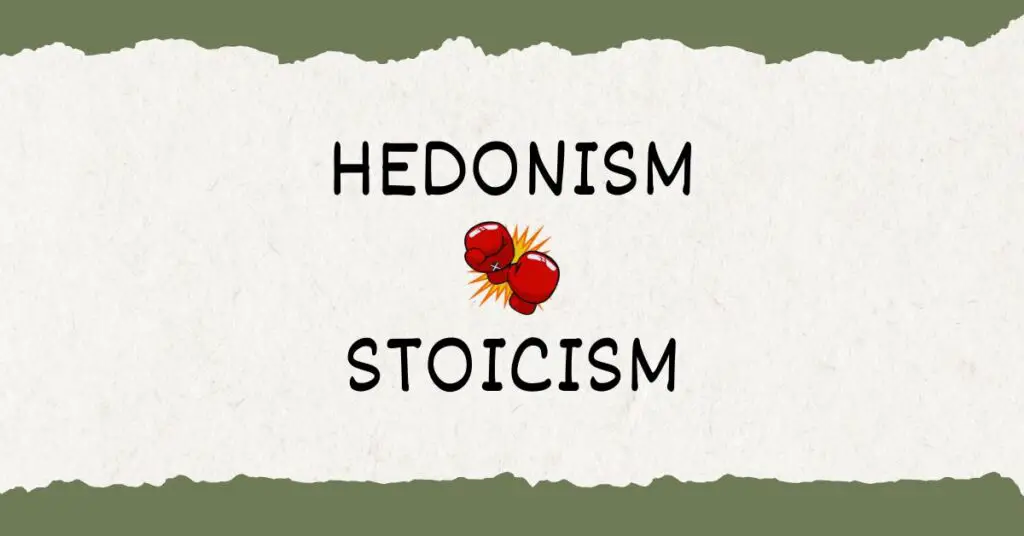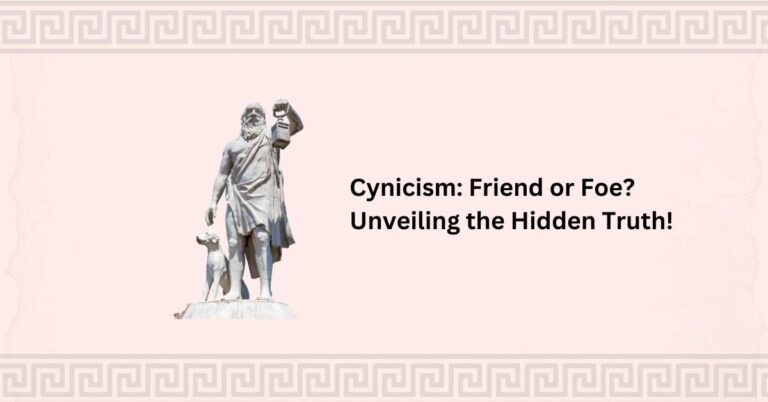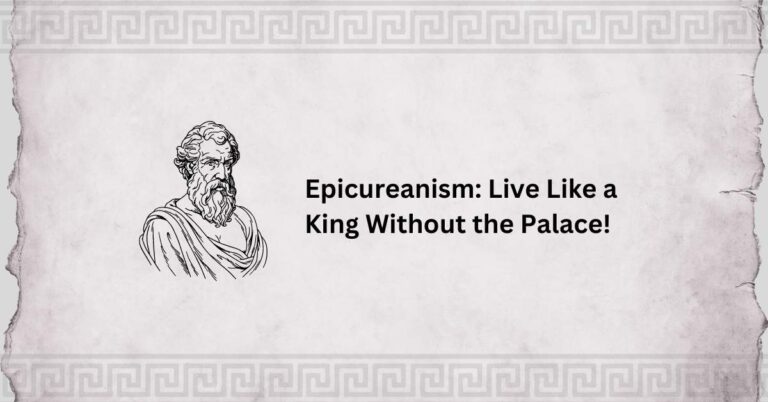Hedonism vs Stoicism: Avoid the Trap of Empty Pleasure!
Welcome to a journey through time-honored philosophies that continue to shape our lives today! Let’s explore two fascinating perspectives: Hedonism and Stoicism. These aren’t just academic terms; they’re ways of life that influence our daily decisions and overall happiness.
Hedonism is the philosophy that pleasure and happiness are the ultimate goals in life. It’s about maximizing joy and minimizing pain. Think of it as the “enjoy every moment” approach. On the flip side, we have Stoicism, which teaches that virtue, defined as living in agreement with nature, is the highest good. Stoics strive for inner peace by mastering their desires and emotions, regardless of external circumstances.
Why does this matter now? In our fast-paced world, these ancient philosophies offer grounded, time-tested insights into fulfilling lives. Whether you’re dealing with stress, seeking happiness, or just trying to get along with others, these ideas have never been more applicable.
In this post, we’ll dive deep into each philosophy, contrast their approaches to life, and discuss how they can be applied today. So, whether you’re a pleasure-seeker or a peace-seeker, stick around—there’s wisdom here for everyone!
Understanding Hedonism:
Defining Hedonism
Hedonism asserts that the pursuit of pleasure is the ultimate aim of human life. This philosophy champions pleasure as the highest good and essential to achieving fulfillment.
Historical Roots and Key Figures
The philosophy of Hedonism can be traced back to ancient Greece, where it was first articulated by figures like Aristippus of Cyrene, a student of Socrates. He advocated for the immediate enjoyment of life’s pleasures. Later, Epicurus refined this idea, emphasizing not just physical pleasures but also the value of mental and emotional tranquility.
Another important figure in the modern era is Jeremy Bentham, who developed a more structured form of Hedonism known as utilitarianism. Bentham’s philosophy focused on maximizing happiness and minimizing suffering for the greatest number of people, expanding Hedonism’s implications from personal to societal levels.
Core Beliefs of Hedonism
Central to Hedonism is the belief that pleasure, both bodily and intellectual, is paramount:
- Bodily Pleasures: These involve direct physical sensations that bring immediate satisfaction, such as tasting delicious food or enjoying a soothing massage.
- Intellectual Pleasures: These pleasures stem from engaging in activities that stimulate the mind and emotions, like solving a challenging puzzle, appreciating art, or developing personal relationships.
Hedonism in Modern Society
In contemporary culture, Hedonistic behaviors manifest in various ways. Our enthusiasm for gourmet dining, luxury spa days, and immersive entertainment experiences highlights our ongoing quest for new pleasures. These modern pursuits show how Hedonism continues to influence our choices and lifestyle, suggesting a deep-rooted human inclination towards seeking pleasure.
This exploration of Hedonism, enhanced by historical and modern perspectives, invites us to consider how deeply the pursuit of pleasure is woven into the fabric of our lives, challenging us to reflect on its role in our personal happiness and societal norms.
Understanding Stoicism:
Defining Stoicism
Stoicism is a philosophy that emphasizes resilience, virtue, and emotional control. It teaches that by mastering our responses to external events, we can achieve inner peace and enduring happiness.
Historical Background and Key Figures
Stoicism was founded in ancient Greece by Zeno of Citium and later popularized in Rome by notable philosophers such as Seneca, Marcus Aurelius, and Epictetus. These thinkers shared teachings on how to live a life of virtue in the face of life’s challenges, making their wisdom timeless.
Core Beliefs and Principles of Stoicism
The Stoic philosophy is built on several foundational principles:
- Virtue as the Highest Good: Stoics believe that living by virtue—wisdom, justice, courage, and moderation—is essential for true happiness, far outweighing physical pleasure or material wealth.
- Acceptance of Fate: A key Stoic principle is the acceptance of things we cannot change. Stoics strive to differentiate between what is within our control and what is not, focusing their energy only on the former.
The Importance of Virtue Over Pleasure
Unlike Hedonism, Stoicism teaches that pleasure is not the goal of life. Instead, achieving a virtuous character and living righteously are seen as the paths to true contentment.
Accepting What You Cannot Control
Stoicism teaches the art of acceptance—understanding that some things in life, such as the actions of others or unforeseen events, are beyond our control. By focusing on our own actions and attitudes, we can maintain tranquility and effectiveness.
Practical Applications of Stoic Principles in Modern Life
Today, Stoic ideas are incredibly relevant, especially in managing stress and emotional well-being. Techniques derived from Stoicism, such as mindfulness and cognitive reframing, are used widely in therapy and personal development. Moreover, the Stoic practice of reflecting on one’s day and setting intentions for personal growth is a valuable tool for self-improvement.
By understanding Stoicism, we can learn to navigate life’s ups and downs with grace and fortitude, applying ancient wisdom to modern challenges and enhancing our capacity for joy and resilience.
Comparative Analysis:
Main Ideas of Hedonism and Stoicism
Hedonism and Stoicism represent two contrasting philosophies on how to achieve happiness. Hedonism advocates for the pursuit of pleasure as the primary goal of life, suggesting that happiness comes from indulging in life’s delights. Stoicism, on the other hand, promotes the pursuit of virtue and emotional resilience, arguing that true contentment comes from inner peace and ethical living.
Attitudes Towards Emotions and Desires
Hedonists see emotions and desires as central to the human experience, encouraging their fulfillment as a path to happiness. Stoics, conversely, believe in controlling and often suppressing desires and emotions to maintain stability and integrity, viewing them as potential disturbances to rational thinking and inner peace.
Long-Term vs. Short-Term Thinking
Hedonism often focuses on immediate gratification, emphasizing short-term pleasures and comforts. Stoicism is inherently long-term in its approach, emphasizing enduring satisfaction through self-control and resilience against life’s challenges.
The Role of Moral Values and Ethics
For Hedonists, ethical considerations are often secondary to the pursuit of pleasure unless they directly contribute to happiness. Stoicism places a strong emphasis on ethics and moral values, believing that a virtuous life aligned with moral principles is the foundation of true happiness.
Advantages and Challenges of Each Philosophy
Hedonism:
- Advantages: Provides immediate satisfaction and joy; encourages enjoyment of life.
- Challenges: Can lead to excess and unsustainable lifestyle choices; may result in longer-term dissatisfaction when the pursuit of pleasure is unchecked.
Stoicism:
- Advantages: Promotes resilience, emotional control, and ethical living; helps individuals cope with adversity.
- Challenges: It can be perceived as emotionally restrictive and austere, and it may limit the enjoyment of life’s pleasures.
Real-life Scenarios Illustrating Each Philosophy
Hedonism Scenario: Imagine someone at a lavish buffet indulging in every type of cuisine, enjoying each taste and moment, focusing solely on the pleasure of eating without worrying about the consequences.
Stoicism Scenario: Consider a person facing a significant professional setback. Instead of dwelling on their frustration or disappointment, they accept the situation and focus on how they can learn from the experience and move forward.
This comparative analysis shows that while Hedonism and Stoicism offer distinct pathways to happiness, they also reflect deeper choices about how we view pleasure, pain, virtue, and the ultimate goals of life. Each philosophy has its merits and can be suited to different personalities and situations, offering diverse tools for navigating the complexities of human existence.
Impact and Influence:
Influence on Other Philosophical Theories
Both Hedonism and Stoicism have significantly shaped philosophical discourse beyond their immediate contexts. Hedonism has influenced utilitarianism, a theory that promotes actions that maximize happiness and minimize pain across society. Stoicism has impacted existentialism and modern rational-emotive behavioral therapy, emphasizing personal responsibility and the internal locus of control.
Impact on Modern Psychological Practices and Lifestyle Choices
Stoicism has found new life in cognitive-behavioral therapy (CBT), which uses Stoic principles to help people change negative thought patterns to improve emotional regulation and mental health. Conversely, Hedonism can be seen in approaches that emphasize positive psychology, focusing on enhancing well-being and happiness through the cultivation of positive emotions and experiences.
Influence on Mental Health Strategies
Stoicism teaches techniques that are now foundational in stress reduction and mental resilience training, such as focusing only on what one can control and accepting what one cannot. Hedonism contributes to mental health by advocating for balanced life enjoyment and the importance of nurturing joy and satisfaction as part of healthy living.
Adoption in Self-Help and Personal Development Circles
In the realm of self-help, Stoicism has become particularly popular, with books and seminars teaching how to apply Stoic exercises daily to cultivate fortitude and wisdom. Hedonism also plays a role in personal development, with its principles being used to
Personal Reflections and Adaptations:
Reflecting on Personal Philosophies
Take a moment to think about your daily choices and behaviors. Do you find yourself seeking comfort and pleasure in life’s little joys, or do you prioritize discipline and resilience in the face of challenges? Most likely, you’ll see elements of both Hedonism and Stoicism in your approach to life. This reflection can help you understand your motivations and perhaps guide you toward a more balanced or satisfying way of living.
Integrating Hedonism and Stoicism in Daily Life
Combining Hedonism and Stoicism might sound challenging, but it can lead to a well-rounded and fulfilling lifestyle. For instance, you can set goals that are not only ambitious but also enjoyable to pursue. Or, you could focus on finding joy in the disciplined pursuit of personal and professional growth. Practically, this could look like enjoying the process of learning a new skill, not just the outcomes, or finding ways to make routine tasks more enjoyable.
Balancing Pleasure and Duty
Balancing these philosophies involves recognizing when to indulge in pleasures and when to adhere to duties that might be less enjoyable but ultimately rewarding. Here’s a simple strategy:
- Set Clear Priorities: Know what’s important in the long term but allow room for spontaneous joys.
- Mindful Indulgence: Enjoy life’s pleasures without overindulgence by staying mindful of your long-term goals.
- Embrace Routine Joy: Incorporate small pleasures into everyday routines to make them more enjoyable.
- Cultivate Resilience: Develop a stoic mindset towards inevitable challenges, focusing on what you can control.
Guidance for Practical Application
Start small by identifying one pleasure you want to enjoy more mindfully and one duty you’d like to approach with a more stoic attitude. Reflect on these experiences weekly to adjust your approach, ensuring a balanced pursuit of happiness and fulfillment.
This section is not just about philosophical understanding but about actionable insights. It’s about making philosophy a living part of your daily life, blending joy with responsibility, and finding that sweet spot where life feels both enjoyable and meaningful. By encouraging this thoughtful integration, you not only enrich your own life but also set a foundation for deeper satisfaction and resilience.
Conclusion:
Throughout this exploration of Hedonism and Stoicism, we’ve delved into two contrasting yet profound approaches to life. Hedonism teaches us the value of embracing pleasure and joy, suggesting that happiness comes from indulging in life’s delights. On the other hand, Stoicism offers a path of resilience and virtue, promoting inner peace through emotional control and ethical living.
Understanding these philosophies is more than an academic exercise; it’s a way to broaden our perspectives on life and enhance our approaches to everyday challenges and joys. Whether you find yourself leaning towards the joyful embrace of Hedonism or the disciplined resilience of Stoicism, each philosophy offers valuable tools for navigating the complexities of modern life.
Now, I invite you to join the conversation. Which philosophy resonates more with you, and why? Do you see yourself as a pleasure-seeker who thrives on enjoying life’s best moments, or do you gravitate towards the stoic approach of maintaining peace through adversity? Share your thoughts and experiences in the comments below. Let’s continue this fascinating discussion about how ancient wisdom can inform and improve our contemporary lives.



